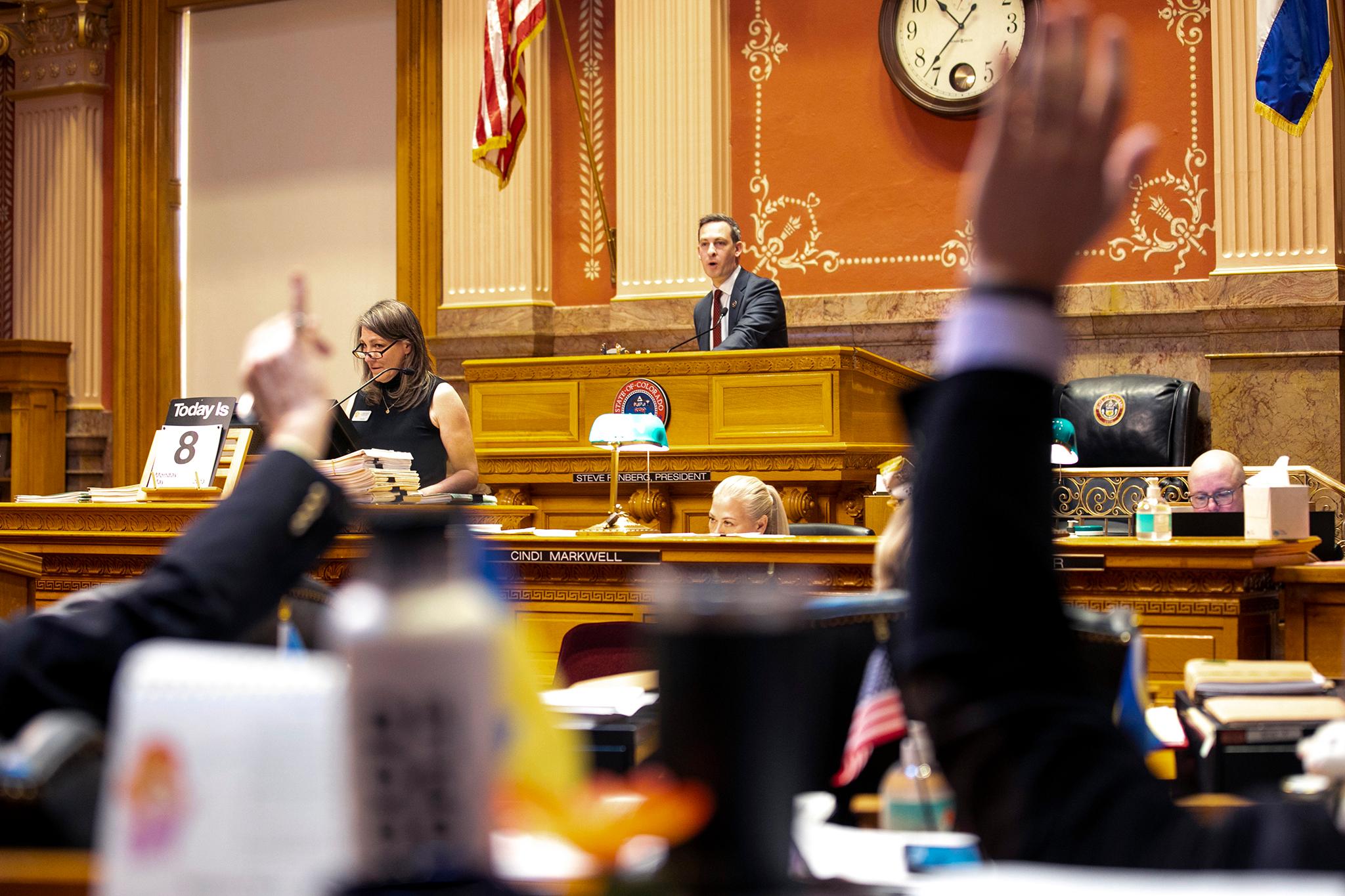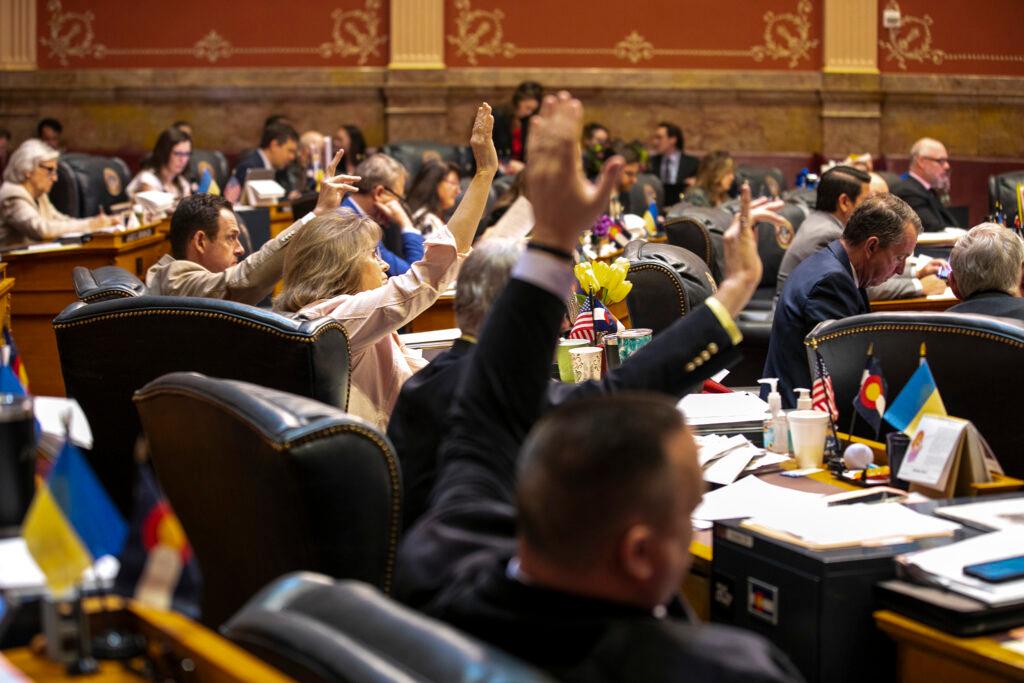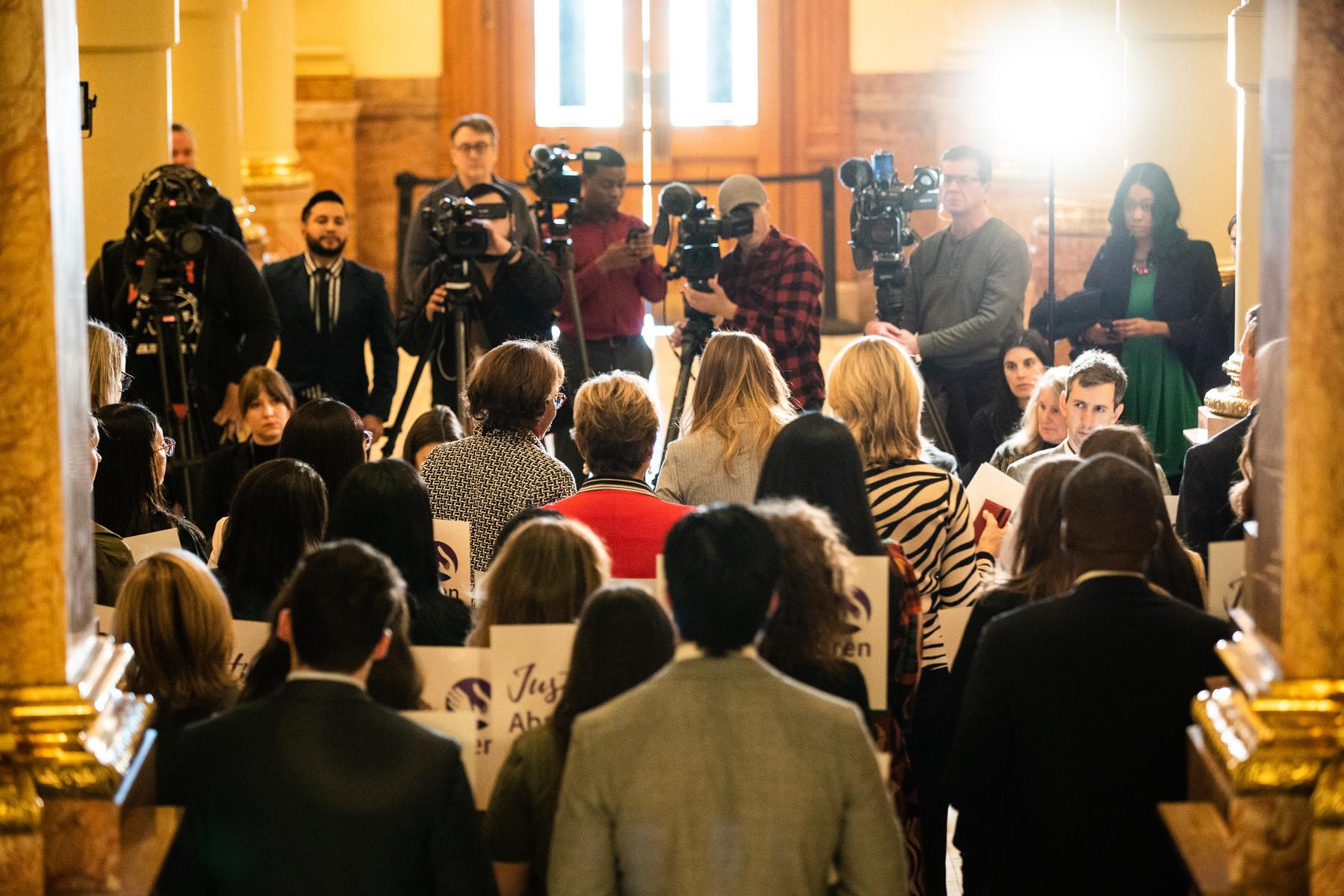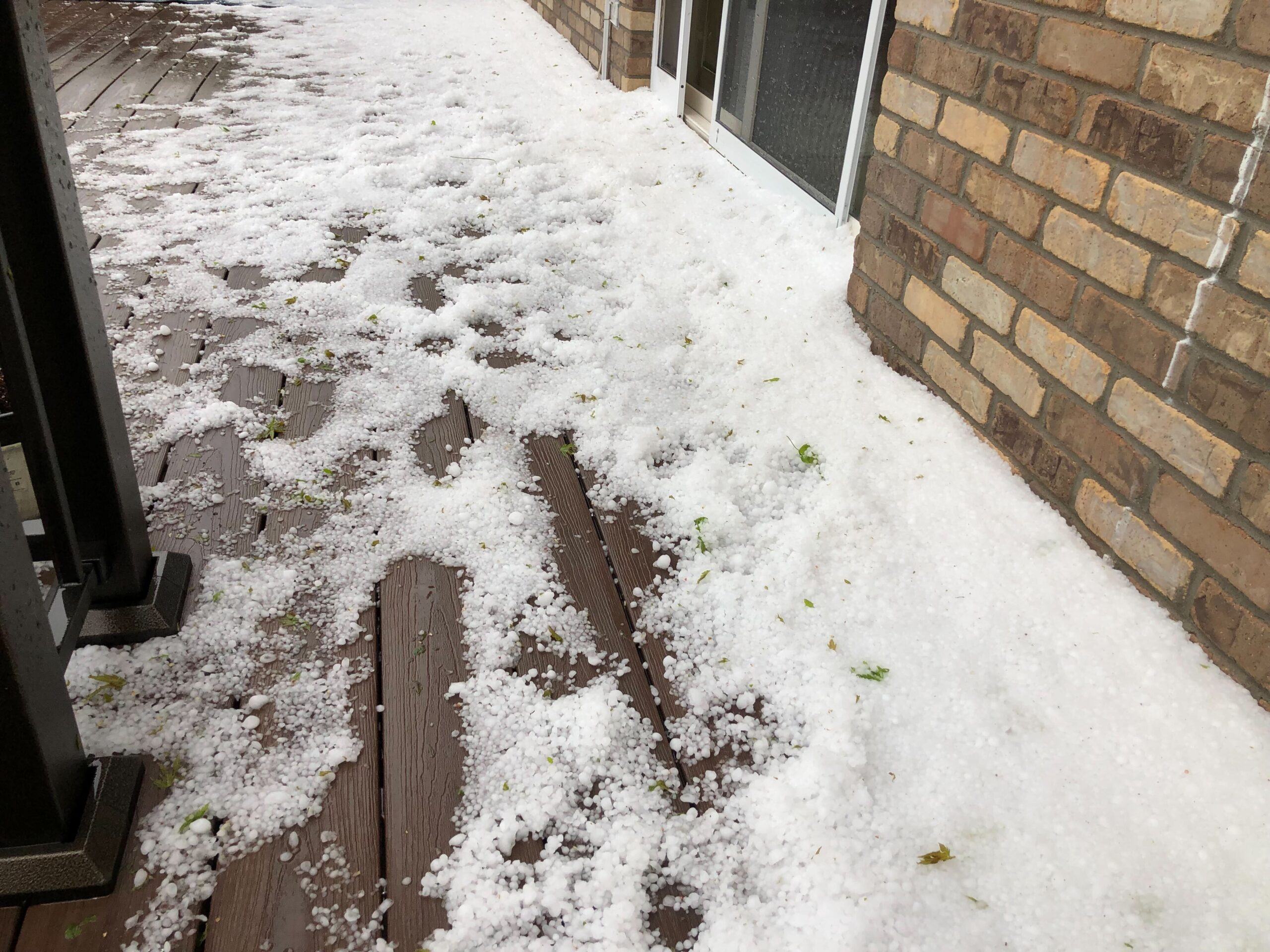
Late on the final day of the 2023 legislative session, dozens of Democratic lawmakers suddenly left the House chamber to hold an impromptu caucus meeting.
The last-minute decision to gather came as chaos swirled in the building — with Republicans walking out in protest and the Democratic governor’s top legislative priority failing in the Senate.
As Democrats quietly gathered in a committee hearing room, staff and members of the media followed. What began as a chance to update lawmakers on the final actions of the session, turned into a tense, nearly hour-long discussion that brought long-simmering conflicts among lawmakers into view.
In many other states, this kind of political caucus meeting would be closed to the public. But Colorado’s transparency laws guarantee public access even to the most heated internal debates.
Colorado’s Open Meeting law has allowed the press and the public to watch similarly unvarnished scenes over the years, including a failed revolt against Republican leadership in 2021.
But many other times, those same transparency laws have been ignored — a fact that now is the subject of two different lawsuits over how lawmakers and party leaders have allegedly strayed from the intent of the open meeting law and open records.
Two Democratic representatives filed the first lawsuit, alleging that both parties routinely hold unannounced and closed-door caucus meetings.
A conservative group filed the second lawsuit, calling out Democrats’ recent use of an anonymous polling system to set their budget funding priorities as a group. They argue it is a semi-secretive planning process and that Democrats are using the “secret ballot” system, also known as the “quadratic voting,” to keep their party’s political debates behind closed doors.
Together, the lawsuits challenge one of the legislature’s open secrets: Lawmakers regularly skirt the state’s Open Meetings Law by holding unannounced meetings behind closed doors so they can quietly plan out legislative action and iron out differences among themselves. They also use disappearing electronic messages to keep some of their communications private.

“Caucuses would meet, yes, sometimes in closed doors,” said Don Valdez, a former Democratic representative from Alamosa. He said these types of discussions happened under both of the Speakers he served with, current House Speaker Julie McCluskie and former Speaker Alec Garnett.
Valdez said there “were good conversations to be had.” But the meetings also violated the law “to a certain point,” he acknowledged, adding that the lawmakers should instead “have them open-door and open to the public.”
Others said the state law sets unrealistic standards, arguing that lawmakers need privacy to have more candid conversations.
“Communication is the key to good policy, and anything you do to hinder communication is not going to be the results that you want in terms of good government,” said former Republican lawmaker Don Coram of Montrose. He served in both the House and the Senate.
“If it ain’t broke don’t fix it. I think it’s functioning fine,” Coram said, deriding the legal action as “petty politics.”
But Rep. Bob Marshall, a Democrat and a plaintiff in the caucus lawsuit, said it was time to act — comparing the action to a “loving intervention with an alcoholic that just can't change and won't change.
Now, state lawmakers face a big question: Will they change their behavior to fit the law? Or will they simply change the law?
“It's an opportunity for elected officials to consider what may have been the norm for a long time, and whether that's really appropriate going forward,” said Margaret Kwoka, a national expert on government transparency who teaches law at The Ohio State University.
Calling out caucus meetings
The caucus lawsuit focuses on a few key points.
First, the legislature’s caucuses — the groups of lawmakers representing the two major political parties — have been holding unannounced meetings and failing to release information about them. The Open Meetings Law states that each caucus is a “public body.” And when a quorum of a public body meets, they must give “full and timely” notice to the public, allow public access and report meeting minutes afterward.
Still, Democratic Senate President Steve Fenberg has broadly defended the need for these kinds of closed-door conversations. Caucus meetings are often used to talk through issues and strategize. And the public still has an opportunity to scrutinize lawmakers and the bills as they go through public hearings and votes before they become law.
“We have to negotiate, we have to compromise, we have to have the discussions. There has to be give and take,” Fenberg said. “If you take some of these lawsuits to their logical conclusion, it is that we should never be able to talk to each other.”
The two Democratic lawmakers that filed suit, Marshall and Rep. Elisabeth Epps, are trying to force a change. Their lawsuit asks the court to order the legislature to follow the open meetings law.
But the plaintiffs don’t necessarily think the current law is the exact right approach, either.
Marshall agreed with Fenberg that it’s very difficult to “do what we need to do if we actually had to follow [the open meetings law].” He said the ultimate goal of the suit is to work with legislative leaders to update the law and the legislature’s practices.
Colorado’s law is somewhat unusual
Colorado is somewhat unusual for its stringent transparency requirements for caucus meetings. Some states, like New York, don’t require any transparency for caucus meetings, and in the U.S. Congress all caucus meetings are behind closed doors.
Kwoka was not immediately aware of any states besides Colorado that subject caucuses to full transparency requirements, nor could she easily find one when she checked at CPR News’ request.
“For those states that have addressed the question, most of them appear to exempt caucusing to some degree from open meetings requirements,” she wrote in an email. There’s a “lot of variance” between states on the issue, she said in an interview.
But that still doesn’t make it legal in Colorado, she added.
“The law has been established as applying to caucuses since the early 1980s,” she said, referring to a state supreme court decision. “This isn't like a new requirement in Colorado.”
The Epps-Marshall lawsuit also alleges that smaller groups of lawmakers are meeting ahead of committee hearings to feel out whether their bills have enough votes, or perhaps even plan out some of the political action. But that also would run afoul of the state’s transparency law if it involves a quorum of any committee’s members.
Fenberg denied that substantial decisions are made in these private meetings.
“No decisions are being made behind closed doors, unless it's like, whatever you want for dinner,” Fenberg said. “But there are negotiations, there are meetings with stakeholders, colleagues. We tell our members … ‘You shouldn't blindside people.’ The way you make good policy is you listen to stakeholders and then you discuss. That's not something that always can happen in a formal committee setting.”
Disappearing messages are a national issue
Colorado voters approved the state’s Sunshine Law back in 1972, riding a wave of citizen activism following the passage of the federal Freedom of Information Act several years earlier. But in the decades since, the advent of new technology has raised constant questions about how the law should be applied.
The lawsuit from Epps and Marshall calls out another practice that has become common in recent years: lawmakers’ use of apps like Signal to send “disappearing” messages to their colleagues.
The messages, which can be set to self-destruct after a certain period of time, are sometimes used as a backchannel for lawmakers to plan and negotiate even as they sit in public meetings, the lawsuit alleged.
Marshall said he’s OK with the use of messaging apps, but only if the records are retained.
“We had meetings-within-meetings during the committee meetings, on Signal threads, discussing what was going on right there, votes and everything,” he recalled.
He’d like to see minimum requirements set for lawmakers’ retention of records. Right now, it’s up to each lawmaker to create their own retention policy.
“We need to look at the sunshine laws in general in view of the modern work that we do with electronics and all that," Marshall said. "We shouldn't be hesitant to talk to each other on electronic mediums, but it should be retained and people allowed to look at what we're talking about.”

Rachael Johnson, with the Reporter's Committee for Freedom of the Press, said that if the laws don’t keep up with new technology, like Signal, the public could lose out on access to information.
“We shouldn't be deleting history from Colorado — information that could certainly provide a lot of context in the future for legislatures who come after,” she said, especially when it comes to any future legal disputes about the intent behind policies.
“The legislature's intent is what a court is required to follow when making its decision about how to interpret a law. So it's a really big part of it and it can't be just erased,” she said.
But some lawmakers have defended the use of private messaging in certain instances. Rep. Matt Soper said it’s simply a new venue for the kinds of private conversations that have always occurred in the legislature.
“In the old days, you had a whip running down the aisle, telling everyone a bit of information that the public certainly didn't hear,” said Soper, a Republican. “So, there's always going to be some communications that are private. That's just part of the business.”
He views apps like Signal as a forum for lawmakers to talk shop and let off steam.
“Certainly if that's gonna become public, I don't know where we let that pressure valve exist, because there needs to be some way for members to be able to express their frustration,” he said, noting that they shouldn’t be used for voting or substantive policy.
Kwoka said that lawmakers might have valid reasons to seek privacy, but she cautioned that if the laws are too loose, lawmakers could draw more and more of the public process into private conversations.
“You don't want to end up in a situation… where all the work has been done in so-called [private] deliberations, the final result is reached, and then everyone puts on a show,” she said.
Marshall said his discussions are continuing with legislative leaders, several of whom have declined to talk to CPR News in detail, citing the ongoing legal case.
The importance of records
Meanwhile, some changes are already in motion — prompted by the second lawsuit.
A conservative group, Advance Colorado, has challenged Democrats’ use of an anonymous voting system to set their priorities as a group.
The suit argues the results from this voting system are essentially records. More importantly, the results direct official action and they should be released.
Democrats have not released information about how individual lawmakers voted, describing it as what they call a budgeting preference poll that has guided the legislature’s spending decisions in recent years.
Fenberg defended the system, saying that it's legal and that it ensures all Democratic lawmakers have a chance to weigh in on the party’s legislative plans.
“This is meant to actually make the process more fair and transparent,” he said.
But Senate Democrats have said they will probably try a new approach next year — perhaps one that does not allow lawmakers to weigh in anonymously. Fenberg said he was considering the change because the lawsuit was unjustly undermining public confidence in the legislature.
Meanwhile, House Democrats have not said whether they’ll abandon the anonymous polling system.
Related coverage
- Why Jared Polis’ land-use bill imploded on the final day of Colorado’s legislative session
- Democrats may control the legislature, but the ‘Red Room of Doom’ put the brakes on some progressive priorities this session
- In final hours of legislative session, Democrats watch some priorities fail and party infighting take hold
- Tensions between House Democrats flare in final hours of session









